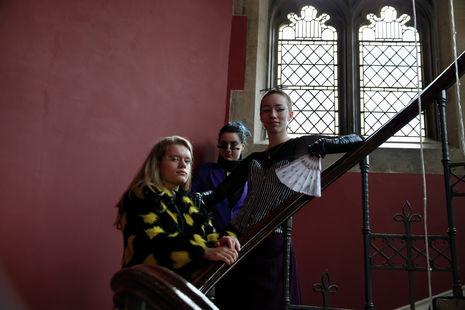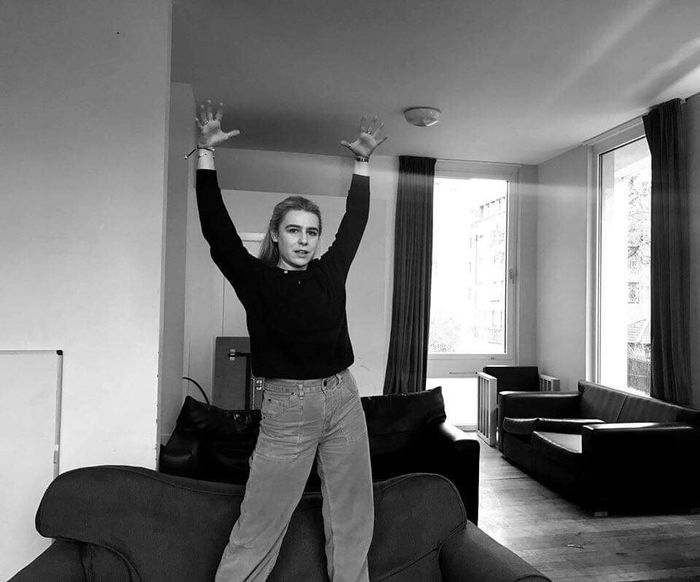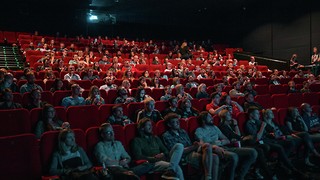SALOME is a missed opportunity
Jenny Hay sees SALOME’s potential, and wishes it had done more to fulfil it

Oscar Wilde’s 1891 biblical tragedy tells the story of Salome, whose request for the head of John the Baptist disgusts her stepfather Herod Antipas but delights her mother. The play is challenging for both the creative team and the audience, and the cast and crew of Salome attempt to rise to the challenge with admirable enthusiasm and creativity, but ultimately fall short.
First, I must say that many aspects of this production were very good. The costumes, by Atlanta Tsiaoukkas and Valentin Foley, were exquisite and betrayed a high level of skill, effort and thought. The servants of Herod were dressed in utilitarian and gender-neutral jumpsuits – a creative decision which perfectly aligns with the production’s emphasis on queer identity – while Herod, Herodias (a particularly stunning highlight) and the Page of Herodias were all in some truly brilliant outfits. The beautiful and skilfully applied make-up also deserves a shout-out, particularly that of Herod and Herodias.
The lighting was also used to great effect – most of the play was lit with a white wash but it occasionally broke out into an intentionally disorientating and other-worldly strobe-like effect whenever John the Baptist made his grand pronouncements, and coloured gels were used well to heighten the mood of various scenes. The sound, while occasionally so loud that dialogue was drowned out, was imaginative and at times even eerie; the booming, warped voice of John filled and overpowered the Corpus Playroom fantastically.
"Unfortunately, fantastic costumes, great lighting and sound work, and a fabulous central performance couldn’t save SALOME from ultimately feeling less than the sum of its parts."
By far the best thing about the play was Celine Clark’s mesmerisingly camp performance as Herod. She has incredible stage presence and absolutely owned her space as she strutted around, seemingly basking in every minute of it. She managed to deliver Wilde’s poetic dialogue naturally – something that the rest of the cast came close to but never completely managed. The play perked up immensely as soon as she came on stage, and she was a joy to watch.
Unfortunately, fantastic costumes, great lighting and sound work, and a fabulous central performance couldn’t save SALOME from ultimately feeling less than the sum of its parts. It seems that the production team had a plethora of great ideas but never quite found a way to bring them all together in a coherent artistic vision, to the point where it could feel like a jumble of good but mismatched elements. Ian Malcolm’s famous Jurassic Park quote comes to mind: “They were so preoccupied with whether or not they could, they didn’t stop to think if they should.”
For instance, the play is set on the Docklands Light Railway, a creative decision I can only describe as baffling. Try as I might – and I really have tried – I can’t for the life of me work out why they chose to set it on a train, as it seems to add nothing to the play on either a literal or symbolic level, and is never actually acknowledged by the characters (granted, I doubt the first-century Palestinians had heard of the DLR). Additionally, the play begins with a long piece of physical theatre which, whilst admittedly skilful, didn’t feel remotely connected to the rest of the play.
Huge emphasis is put on the queerness of this telling of Salome, and while I (especially as a queer person myself) delight in the visibility of LGBTQ identity and experience in the creative sphere, the production struggles to draw and refine this overt queerness into a coherent artistic statement. The very first production of Salome took place while Oscar Wilde was in prison for being gay, so there are real opportunities here for powerful and resonant queer themes – sadly, they were missed.
SALOME contains some real gems, and some admirable and creative yet sadly underdeveloped themes. The production team clearly came up with some excellent ideas but ultimately these elements failed to coalesce into one coherent, meaningful whole.
 News / Tompkins Table 2025: Trinity widens gap on Christ’s19 August 2025
News / Tompkins Table 2025: Trinity widens gap on Christ’s19 August 2025 Comment / A plague on your new-build houses18 August 2025
Comment / A plague on your new-build houses18 August 2025 News / Trinity sells O2 Arena lease for £90m12 August 2025
News / Trinity sells O2 Arena lease for £90m12 August 2025 News / Pro-Palestine activists spray-paint Barclays Eagle Labs18 August 2025
News / Pro-Palestine activists spray-paint Barclays Eagle Labs18 August 2025 News / Uni welcomes new students14 August 2025
News / Uni welcomes new students14 August 2025










